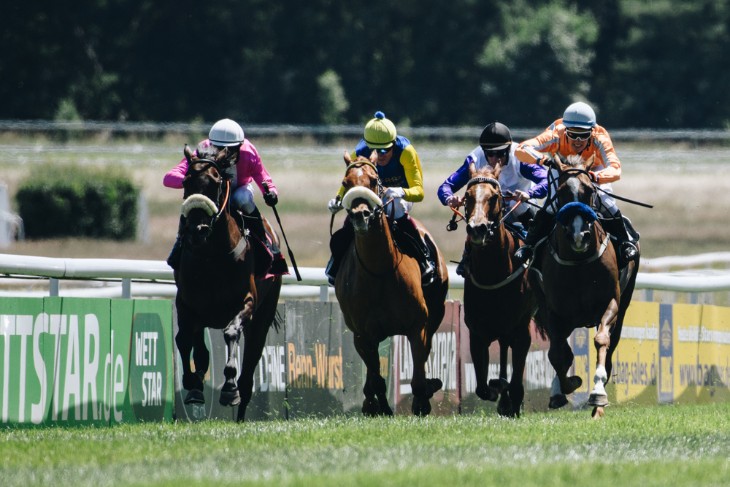Horse racing, a sport steeped in tradition and history, has not only captivated enthusiasts for centuries but has also attracted the attention of sponsors looking to invest in this thrilling and prestigious industry. The role of sponsorship in horse racing has evolved significantly over time, with its presence becoming more pronounced in contemporary sporting events. In this article, we delve into the world of horse racing sponsorship, exploring how it benefits the sport, and highlighting some notable sponsorships that have left a lasting impact.
Horse Racing Sponsorship
Sponsorship has become an integral part of modern-day horse racing, playing a crucial role in the financial sustainability and growth of the sport. But how did it all begin? To comprehend the significance of sponsorship in horse racing, we must first cast our gaze back into history.
In the early days of horse racing, sponsorship was not as prominent as it is today. The sport relied primarily on aristocratic patrons who owned and financed racing stables, horses, and the events themselves. However, as horse racing grew in popularity, the financial burden of hosting races and maintaining racecourses became more apparent.
The turning point came in the late 19th and early 20th centuries when commercial entities started to recognize the potential of sponsoring horse racing events. Companies began to see the sport as a platform to showcase their brands, products, and services to a wide and diverse audience. The infusion of sponsorships brought in much-needed funds, enabling race organisers to improve infrastructure, prize money, and overall race quality.
Historical Perspectives on Sponsorship in Horse Racing
The history of sponsorship in horse racing is intertwined with some fascinating tales of renowned patrons who left an indelible mark on the sport. One such figure was the 17th-century British monarch, King James I, who took a keen interest in horse racing and often sponsored races himself. His passion for the sport, combined with his financial support, helped establish a strong racing culture that would endure through the ages.
Moving forward, the 20th century witnessed a surge in corporate sponsorships in horse racing. Companies from various industries, such as banking, brewing, and automotive, saw horse racing as an excellent opportunity to bolster their public image and engage with consumers. This era witnessed some iconic sponsorships that are still remembered today.
One of the most iconic and enduring sponsorships was the Grand National's partnership with the betting company, Aintree. This collaboration not only ensured the survival of the Grand National but also elevated it to an internationally acclaimed event. The influx of sponsorship funds led to improvements in safety measures, prize money, and global television coverage, making the Grand National a staple in the sporting calendar.
The Significance of Sponsorship in Contemporary Horse Racing
In the modern era of horse racing, sponsorship has assumed a pivotal role, driving the sport's growth and enhancing the overall experience for participants and spectators alike. As horse racing events expanded in scale and popularity, the need for financial backing became more pronounced. Corporate sponsorships stepped in to fill this void, injecting much-needed funds into racecourses, prize pools, and promotional activities.
Sponsorship not only provides monetary support but also lends credibility and prestige to racing events. When reputable companies associate their brands with prestigious races, it elevates the event's status and draws greater attention from the media and the public. Moreover, sponsorships have allowed organisers to introduce innovative technologies, such as high-definition video displays, online betting platforms, and real-time race data analytics, enhancing the spectator experience and broadening the sport's appeal.
Beyond the immediate financial benefits, sponsorship has helped create a sustainable ecosystem for horse racing. The influx of funds has allowed race organisers to improve race facilities, maintain world-class tracks, and provide better facilities for the horses and jockeys. This, in turn, attracts more talented participants and enhances the overall competitiveness of the sport.

Unraveling the Mechanics of Horse Racing Sponsorship Deals
The process of securing sponsorship for horse racing events involves intricate negotiations and strategic partnerships. For race organisers, the first step is to identify potential sponsors whose brand values align with the sport's image and target audience. Companies that have a vested interest in reaching a similar demographic often find horse racing sponsorships to be an attractive proposition.
Once potential sponsors are identified, the next phase involves crafting sponsorship packages tailored to the sponsors' needs and budgets. These packages may include a combination of branding opportunities, on-site advertisements, hospitality packages, digital marketing exposure, and naming rights for specific races or events. The negotiation process can be both challenging and rewarding, as sponsors seek maximum exposure and return on their investment, while race organisers strive to secure sufficient funding to elevate the event's status and quality.
In recent years, digital marketing and social media have played a crucial role in enhancing the value of horse racing sponsorships. Sponsors benefit from increased visibility and engagement through various online channels, reaching a wider and more diverse audience beyond the confines of the racecourse.
The mechanics of sponsorship deals have also diversified to include partnerships beyond individual races. Long-term sponsorship agreements between companies and racing stables have become more common, with sponsors providing financial support in exchange for branding on horses, jockeys' uniforms, and other promotional opportunities. These extended partnerships offer sponsors prolonged exposure throughout the racing season, strengthening their brand presence and affinity with the sport.
The Impact of Sponsorship on Horse Racing Events and Competitions
Sponsorship has had a profound impact on horse racing events and competitions, leaving a lasting impression on both the sport's landscape and the experiences of those involved. One of the key areas where sponsorship has made a difference is in the overall quality and grandeur of racing events. As sponsors invest in racecourses and facilities, the infrastructure receives much-needed upgrades, providing a more comfortable and enjoyable experience for attendees.
Moreover, the financial backing from sponsors has allowed race organisers to offer substantial prize money, attracting top-tier jockeys and horses from around the world. The allure of lucrative purses and prestigious sponsorships has elevated the level of competition, leading to fiercely contested races and thrilling displays of skill and horsemanship.
For racegoers and viewers at home, sponsorship has brought about enhanced broadcasting and coverage. With sponsors keen on showcasing their involvement, races are now broadcasted on global platforms, reaching a broader audience than ever before. This increased exposure not only promotes horse racing to new fans but also attracts more sponsors looking to tap into the sport's growing popularity.
The partnership between sponsors and horse racing events extends beyond financial contributions. Sponsors often engage in philanthropic efforts, supporting causes related to the welfare of horses and contributing to local communities. Such initiatives bolster the sport's image and demonstrate sponsors' commitment to its sustainability and ethical considerations.
Advantages and Benefits of Sponsorship in the Horse Racing Industry
The horse racing industry reaps numerous advantages and benefits from sponso rship arrangements. One of the most evident advantages is the injection of capital that sponsors bring into the sport. The financial support facilitates not only the organization of races but also the development of grassroots initiatives, youth programs, and horse breeding projects that ensure the sport's long-term viability.
rship arrangements. One of the most evident advantages is the injection of capital that sponsors bring into the sport. The financial support facilitates not only the organization of races but also the development of grassroots initiatives, youth programs, and horse breeding projects that ensure the sport's long-term viability.
Furthermore, the symbiotic relationship between sponsors and horse racing creates a win-win situation. Sponsors gain exposure and brand recognition, tapping into the sport's loyal and passionate fan base. Meanwhile, horse racing gains access to sponsors' marketing expertise, enabling the sport to reach new demographics and expand its global footprint.
Sponsorships also facilitate innovation and technological advancements within the sport. From state-of-the-art timing systems to cutting-edge broadcasting technologies, sponsors often introduce novel solutions that enhance the overall racing experience. For instance, GPS tracking devices now offer real-time insights into a horse's performance, providing fans with deeper engagement and understanding of races.
Another valuable benefit of sponsorship is the positive impact it has on smaller racecourses and local events. As sponsors seek to diversify their portfolios, they invest in races beyond the marquee events, elevating the profile of smaller races and giving them a chance to shine. This, in turn, stimulates interest in local racing communities and encourages participation from a broader range of stables and jockeys.
Case Studies of Notable Horse Racing Sponsorship Success Stories
Throughout the history of horse racing, several sponsorship success stories have exemplified the positive impact of corporate involvement in the sport. One such standout example is the partnership between a prominent telecommunications company and a renowned racing event. By sponsoring a prestigious horse racing festival, the telecommunications company gained significant brand exposure, reaching a vast and engaged audience both at the racecourse and through televised broadcasts.
This successful collaboration led to increased consumer awareness and a boost in customer engagement. The sponsor's branding adorned the racecourse, including the finish line, race barriers, and even jockeys' silks, creating a pervasive and memorable presence throughout the event. Additionally, the company leveraged social media and digital platforms to host interactive contests and engage with fans, amplifying their reach to online audiences.
Another noteworthy success story involves a luxury watch brand's sponsorship of a high-profile horse racing championship. By associating with one of the most prestigious races in the world, the watch brand not only showcased its products to a discerning audience but also aligned its image with the elegance and precision synonymous with the sport of kings.
The watch brand capitalized on the event to launch a limited-edition timepiece collection, featuring equestrian-inspired designs that resonated with racing enthusiasts. This strategic move not only bolstered the brand's reputation but also resulted in significant sales growth and heightened interest from collectors and horological aficionados alike.
Such case studies highlight the effectiveness of strategic sponsorship in horse racing. When sponsors choose to invest in races that align with their target audience and brand ethos, the impact goes beyond mere financial support. The synergy between sponsor and event can lead to enhanced brand recognition, improved customer loyalty, and the creation of a lasting legacy in the world of horse racing.
Challenges and Pitfalls in Horse Racing Sponsorship Endeavors
While horse racing sponsorships offer a plethora of benefits, they are not without challenges and potential pitfalls. One of the primary concerns is the risk associated with sponsor visibility. With multiple sponsors vying for attention at prominent racing events, there is a danger of visual clutter, which can dilute the impact of individual brand messages.
Sponsors must, therefore, strategize their activation efforts to stand out amidst the array of logos and branding materials. This may involve creative advertising displays, engaging activations, or exclusive experiences for racegoers, all designed to leave a lasting impression in a competitive environment.
Another challenge is the ever-changing landscape of the horse racing industry itself. As the sport evolves, sponsors must adapt their strategies to align with shifting audience preferences, regulatory changes, and technological advancements. Staying relevant and resonating with the audience requires ongoing research, flexibility, and a commitment to understanding the dynamics of the sport and its fanbase.
Additionally, sponsors must navigate potential controversies that may arise within the horse racing industry. The sport's integrity and ethical considerations have come under scrutiny at times, and sponsors must be vigilant in their affiliations to avoid any negative associations that could tarnish their brand image.
Despite these challenges, savvy sponsors who approach horse racing sponsorships with foresight and a thorough understanding of the sport's nuances can unlock tremendous opportunities. By embracing innovation, forging meaningful connections with fans, and maintaining a commitment to the welfare of horses and participants, sponsors can create enduring partnerships that enrich the sport of horse racing for generations to come.
Future Trends and Innovations in Horse Racing Sponsorship
As the world of horse racing sponsorship continues to evolve, so do the trends and innovations that shape its landscape. One of the most prominent trends is the integration of technology in sponsorship activations. With the rise of digital platforms and social media, sponsors are exploring creative ways to engage with fans beyond the racecourse.
Virtual reality experiences, for instance, allow racing enthusiasts to immerse themselves in the excitement of a race, virtually riding alongside their favorite jockeys. Augmented reality activations at race events enable attendees to interact with virtual horses and explore behind-the-scenes areas of the racecourse. These technological advances not only enhance the fan experience but also offer sponsors unique opportunities to showcase their brands in the digital realm.
Moreover, data analytics and artificial intelligence are revolutionizing sponsorship measurement and evaluation. Sponsors can now track the impact of their activations in real-time, gaining valuable insights into consumer behavior, brand reach, and return on investment. Such data-driven approaches enable sponsors to fine-tune their strategies, making informed decisions about future sponsorships and maximizing their impact.
Sustainability and social responsibility have also emerged as crucial considerations in horse racing sponsorships. Companies are increasingly seeking to align their brands with environmentally conscious and ethical initiatives. Sponsoring events that promote eco-friendly practices and support equine welfare can enhance a brand's reputation and resonate with consumers who value sustainable and responsible business practices.
Furthermore, inclusivity and diversity are gaining traction in the sponsorship realm. Sponsors are exploring opportunities to celebrate and promote diversity within the sport, be it through initiatives that encourage participation from underrepresented groups or collaborations that champion inclusivity on and off the racecourse.
In closing, horse racing sponsorship continues to be a dynamic and vital force, underpinning the continued growth and success of this beloved sport. As sponsors and race organisers collaborate, fueled by a passion for excellence and innovation, the future of horse racing sponsorship promises to be a thrilling and rewarding journey for all involved. So, let us celebrate the enduring legacy of sponsorship in horse racing and anticipate the promising horizons that lie ahead!








